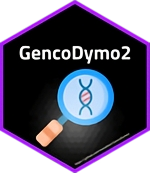📦 Overview
GencoDymo2 is an R package tailored for dynamic extraction, exploration, and comparison of gene annotations from the GENCODE database for human and mouse genomes. This tool facilitates:
- Automated retrieval of the latest or specific GENCODE releases
- Visualization and quantification of annotation changes across versions
- Extraction of introns, exons, splice motifs
- Generation of splice site FASTA files for tools like MaxEntScan
It bridges bioinformatics workflows and annotation dynamics, enhancing reproducibility and comparative studies in transcriptome and splicing research.
💻 Installation
You can install the stable version of GencoDymo2 from CRAN:
# Install the stable version from CRAN
install.packages("GencoDymo2")Or you can install the development version from GitHub for the latest features:
#Install the development version from GitHub
install.packages("pak")
pak::pkg_install("monahton/GencoDymo2")
# Load the package
library(GencoDymo2)🚀 Getting Started
To get started, view the vignette:
vignette("GencoDymo2")Or visit the documentation website:
👉 https://monahton.github.io/GencoDymo2/
👉 https://monahton.github.io/GencoDymo2/articles/GencoDymo2_vignette.html
📁 Functions Highlights
| Function | Description |
|---|---|
get_latest_release() |
Retrieves the latest available GENCODE release per species |
compare_release() |
compare annotation statistics between releases |
extract_introns() |
Extracts and processes introns from annotation |
assign_splice_sites() |
Assign the donor and acceptor splice sites |
extract_ss_motif() |
Extract splicing motifs for MaxEntScan tool |
🛠️ Development & Contributing
GencoDymo2 is actively developed. Contributions and suggestions are welcome!
- 🔧 Open issues: https://github.com/monahton/GencoDymo2/issues
- 📬 Email: aboualezz.monah@hsr.it
- 🤝 Pull requests encouraged!
✍️ Author
Monah Abou Alezz, PhD – aboualezz.monah@hsr.it.
San Raffaele Telethon Institute for Gene Therapy (SR-TIGET)
IRCCS San Raffaele Scientific Institute, Milan, Italy








